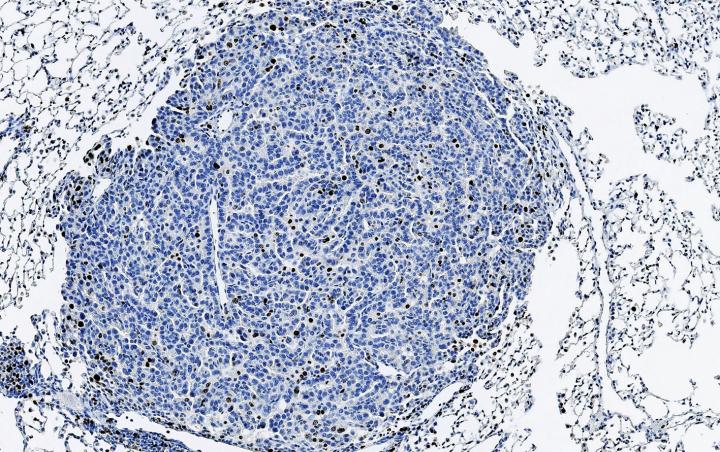January 23, 2020 -- The protein kinase p38α has been identified as a key element supporting KRAS-driven lung cancers, so inhibiting the protein has potential as a target for the treatment of certain lung cancers. An international group of researchers used genetic mouse models with the KRAS mutation to observe how p38α inhibition reduces tumor growth. The work was published in the Proceedings of the National Academy of Sciences on January 22.
Lung cancer is extremely lethal, killing more than 1.7 million people in the U.S. in 2018 alone. Lung adenocarcinomas are typically treated with tyrosine kinase inhibitors; however, tumors can become resistant in less than a year.
This has forced researchers to develop targeted therapies for KRAS-induced lung tumors, which are responsible for approximately 25% of lung cancer cases. This is notoriously difficult, as mutated KRAS forms lack suitable pockets for drugs to bind to and block oncogenic function.
An alternative approach involves targeting synthetic lethal partners of mutated KRAS, which compromises the viability of the cancer cells. One such partner is protein kinase p38α, also known as mitogen-activated protein kinase 14. This nononcogenic signaling molecule is involved in orchestrating many cellular processes.
The results of the current study revealed that p38α expression correlates with malignancy and poor prognosis in lung adenocarcinoma patients. P38α promotes KRAS-driven tumor growth. The researchers from the Institute for Research in Biomedicine (IRB Barcelona) demonstrated that p38α regulates targets such as TIMP-1, a metalloproteinase inhibitor. Here, p38α promotes the expression of TIMP-1, which in turn stimulates cell proliferation in an autocrine manner.
The study confirms p38α as a synthetic lethal interactor of KRAS in lung epithelial cells. The researchers artificially blocked the production of p38α, which allowed them to determine that p38α activity is required for genetically induced lung tumors to progress to advanced stages. Moreover, cancer cells rely on p38α signaling to proliferate within the lung in vivo. Specifically, while metastasis of lung cancer depends on p38α, the malignancy and size of the tumor are determined by p38α levels.

Other studies utilizing information from cancer genome databases confirm that patients with lower levels of p38α in tumors have a more favorable prognosis. Overall, the results of the study show the protumorigenic function of p38α in epithelial cancer cells of KRAS-driven lung tumors.
This research "shows how tumors exploit a protein, which in principle protects healthy lung cells, for their own progression," said lead author Jessica Vitos, PhD, in a statement. The study may lead to the development of new therapeutic applications.
"Chemical compounds that inhibit p38α function would interfere with the growth of lung cancer cells," she explained.
Do you have a unique perspective on your research related to cancer research? Contact the editor today to learn more.
Copyright © 2020 scienceboard.net






